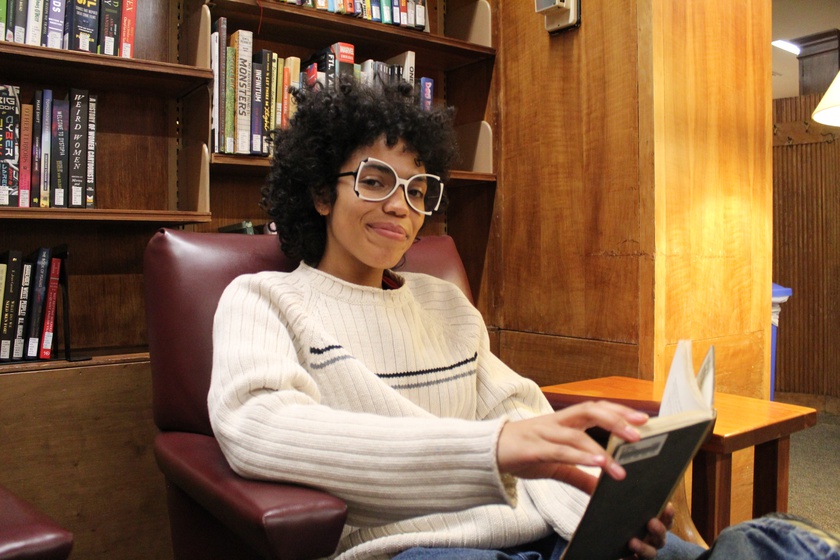{shortcode-2cd1e98139212fcc28afd570aa307ded8c75422e}
{shortcode-dd08abb0bb2b02bf4881baaa9fb305566107f8d4}he day I meet Matilda Marcus ’24, they are late. Fourteen minutes past the hour.
“I was actually just on the phone with my best friend from home, who I went to elementary school with. We’ve been best friends since we were seven,” they tell me. “We’re still best best friends. She has a key to my house; she’s coming to my graduation as a member of my family.”
The term “best friend” rolls off Matilda’s tongue often. “Best Friend” — itself a superlative — implies one chosen from many, but that definition wouldn’t do for Matilda: they use the tag for many people in their life.
One of those other best friends is Matilda’s roommate. This past year, Matilda did something that, in Harvard’s hallowed halls, borders on sacrilege: they transferred from the refuge of a river house to the distant lands of the Quad.
“I just wanted a more peaceful life. I wanted less river, less Harvard,” they say of transferring from Dunster to Cabot. “It’s made me enjoy the University way more, when I’m away from it.”
Some might imagine that Matilda was trading close ties for peace and serenity. But their case has been quite the opposite.
“I would say that truly, the dorm has somebody there maybe four times a week, five times a week.” They explain that their best friend will “text at midday and be like, ‘Okay, who are we inviting over tonight?’ It’s calculated, but in a way that’s just, ‘Yeah, let’s build a friendship with this person.’”
It’s not just about who’s coming; it’s about the environment they’re entering too. In the middle of a conversation with their roommate last week, Matilda recalls saying, “‘Can you just give me a second?’ I closed all the doors in our common room and I turned the lights down and I just changed the ambiance of the room.”
“I was like, ‘we want to invite people over to try and build intimate relationships with them,’” they say. “And we can’t do that unless the context is giving that too. So why don’t we induce this?”
These are the kinds of questions Matilda doesn’t shy away from asking. “I’m not afraid of saying those sorts of things explicitly. Like, let’s get deep, let’s get deep!”
Their approach to “friend-making,” as Matilda calls it, is an attempt to go against the milieu. “I feel like so much of friendship here is like ‘friendship’,” they say, making air quotes. “It’s beyond fair-weather friendship and it’s more like network-acquaintance friends.”
Matilda grew up in South London — “the best city ever to grow up in.”
“My admissions file says, which is pretty crazy, ‘Modest Afro-Caribbean background now single-parented,’” Matilda tells me. “I was raised by my mom. When I was seven, she liquidized her pension and put me in private school.”
Her nine years at that school — which was all-girls with roughly 60 students per class — were formative, not least because of the intimacy.
“You knew everybody’s name,” Matilda says.
“It was this alternate reality — this matriarchy. I went home to a mother. I had two male teachers, maybe three. And yeah, it was so awesome.”
Matilda carries their upbringing with them like the freckles on their nose. “Something I really love about home, that I feel has shaped me in a big way, is feeling that part of my social contract,” they trail off into a chuckle, “is this real sense of community, at least with other Londoners.”
I asked Matilda what it was like to come from this Rousseauian world to the United States, the land of rugged individualism, and ‘e pluribus unum’ — out of many, one.
“I sort of just built my own society, honestly,” they tell me.“All of my friends were raised by immigrants, or are not American themselves.”
Matilda traces their closest friends on campus to two spaces: The first is Harvard Radio Broadcasting — known by its call name, WHRB — where they are the Social Chair of the Record Hospital department. The other space is their multimedia learning job at the Derek Bok Center for Teaching and Learning.
Giving advice is a long-running thread in Matilda’s life. In their last week of secondary school, a friend told Matilda about a conversation mentioning them. Someone asked, “‘Is it just me or does Matilda know your darkest secret?’” And then somebody else answered, Matilda explains, “‘No, no, she knows mine too.’ And the conclusion of the conversation was: she could break us. She could break us all.”
“I have always been the secret holder,” they say. “And I love it.”
As much as Matilda is an advice-giver, they’re also an advice-receiver. “My whole life I’ve been getting myself in trouble, not by telling other people’s gossip, but just telling my own,” they say. Now, they’ve reached a point where “I have a rule that when something happens, I am allowed to tell one inside-of-school friend, one outside-of-school friend and wait for two weeks.”
It is not just London or their matriarchal upbringing, to which Matilda attributes the strength of their friendships. “It’s also just the wonderful power of weed, right?” they explain. “I’m being really serious, it has not only cemented but forged so many of my friendships here.”
Preparing to leave Harvard, Matilda says “the rose tint is coming down.” They’ll go on to do many things, chief of which will be to “build that community wherever I go.” Before that, though, will be some time spent with the person that I sense also belongs on their list of best friends — Matilda’s mother.
As they pull their brown-stitched denim jacket over their shoulders, I tell them that their profile will be in print. “I’ll mail it to my mom,” they say. “She’ll be happy. This is my legacy.”
— Magazine writer Sazi T. Bongwe can be reached at sazi.bongwe@thecrimson.com. Follow him on Twitter @sazibongwe_.


